Entrepreneurship and Small Business Management
VerifiedAdded on 2020/12/29
|12
|3621
|37
Report
AI Summary
This report provides a comprehensive analysis of entrepreneurship, covering various types of ventures, their impact on the economy, the importance of small businesses and startups, the skills and traits of successful entrepreneurs, and the influence of personal background and experiences on entrepreneurial success.
Contribute Materials
Your contribution can guide someone’s learning journey. Share your
documents today.

Entrepreneurship and Small
Business Management
Business Management
Secure Best Marks with AI Grader
Need help grading? Try our AI Grader for instant feedback on your assignments.

TABLE OF CONTENTS
INTRODUCTION...........................................................................................................................1
P1. Different types of entrepreneurial ventures and their relation with typology..................1
P2. Similarities and differences of different types of entrepreneurial ventures.....................2
P3. Impact of small businesses on the economy....................................................................4
P4. Importance of small businesses and business start-ups on the growth of social economy4
PART 2............................................................................................................................................6
P5. Skills and characteristic traits of two successful entrepreneur.........................................6
P6. The way entrepreneurial personality reflects on entrepreneurial motivation and mind-set
................................................................................................................................................7
P7. The way a person’s background and past experiences can hinder or foster
entrepreneurship.....................................................................................................................8
CONCLUSION................................................................................................................................9
REFERENCES..............................................................................................................................10
INTRODUCTION...........................................................................................................................1
P1. Different types of entrepreneurial ventures and their relation with typology..................1
P2. Similarities and differences of different types of entrepreneurial ventures.....................2
P3. Impact of small businesses on the economy....................................................................4
P4. Importance of small businesses and business start-ups on the growth of social economy4
PART 2............................................................................................................................................6
P5. Skills and characteristic traits of two successful entrepreneur.........................................6
P6. The way entrepreneurial personality reflects on entrepreneurial motivation and mind-set
................................................................................................................................................7
P7. The way a person’s background and past experiences can hinder or foster
entrepreneurship.....................................................................................................................8
CONCLUSION................................................................................................................................9
REFERENCES..............................................................................................................................10
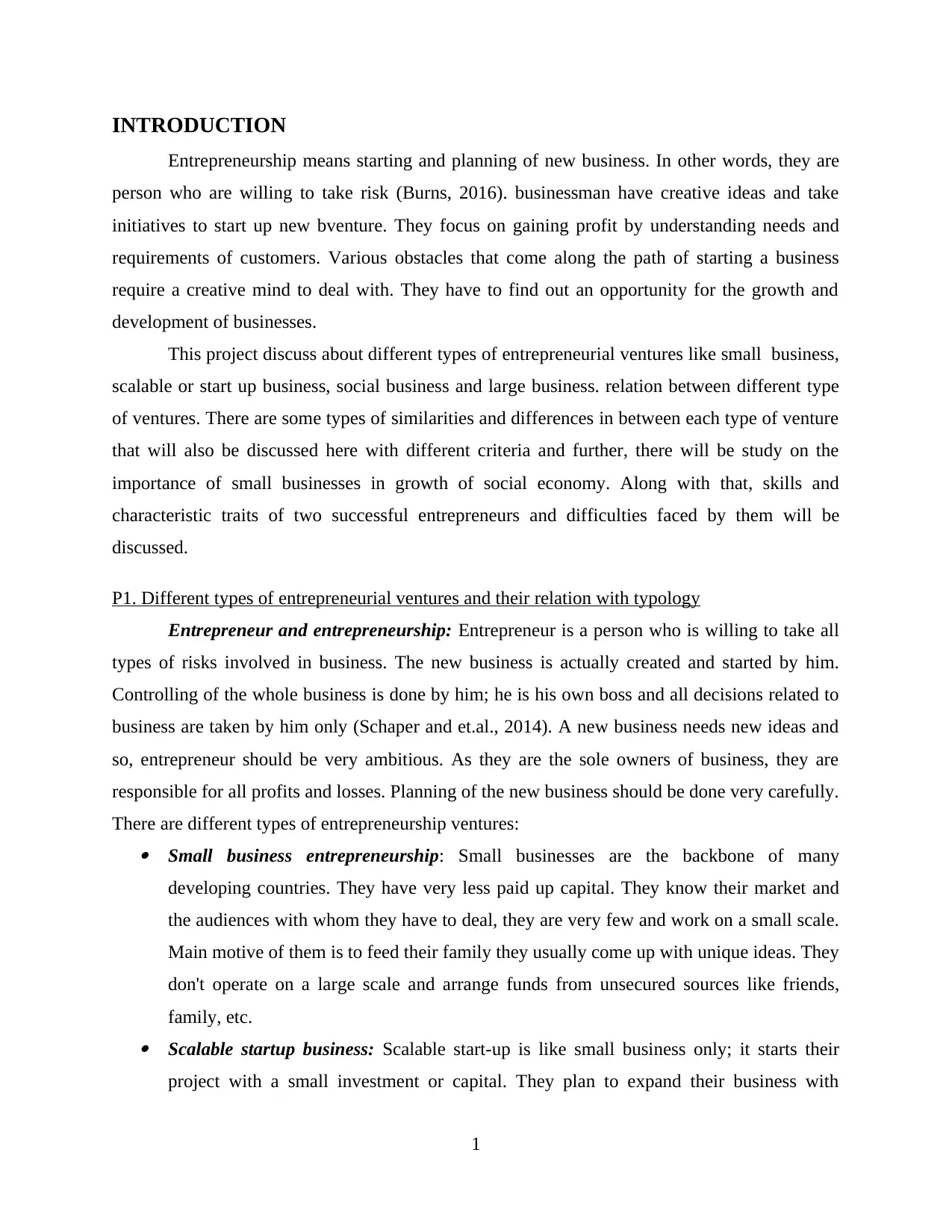
INTRODUCTION
Entrepreneurship means starting and planning of new business. In other words, they are
person who are willing to take risk (Burns, 2016). businessman have creative ideas and take
initiatives to start up new bventure. They focus on gaining profit by understanding needs and
requirements of customers. Various obstacles that come along the path of starting a business
require a creative mind to deal with. They have to find out an opportunity for the growth and
development of businesses.
This project discuss about different types of entrepreneurial ventures like small business,
scalable or start up business, social business and large business. relation between different type
of ventures. There are some types of similarities and differences in between each type of venture
that will also be discussed here with different criteria and further, there will be study on the
importance of small businesses in growth of social economy. Along with that, skills and
characteristic traits of two successful entrepreneurs and difficulties faced by them will be
discussed.
P1. Different types of entrepreneurial ventures and their relation with typology
Entrepreneur and entrepreneurship: Entrepreneur is a person who is willing to take all
types of risks involved in business. The new business is actually created and started by him.
Controlling of the whole business is done by him; he is his own boss and all decisions related to
business are taken by him only (Schaper and et.al., 2014). A new business needs new ideas and
so, entrepreneur should be very ambitious. As they are the sole owners of business, they are
responsible for all profits and losses. Planning of the new business should be done very carefully.
There are different types of entrepreneurship ventures: Small business entrepreneurship: Small businesses are the backbone of many
developing countries. They have very less paid up capital. They know their market and
the audiences with whom they have to deal, they are very few and work on a small scale.
Main motive of them is to feed their family they usually come up with unique ideas. They
don't operate on a large scale and arrange funds from unsecured sources like friends,
family, etc. Scalable startup business: Scalable start-up is like small business only; it starts their
project with a small investment or capital. They plan to expand their business with
1
Entrepreneurship means starting and planning of new business. In other words, they are
person who are willing to take risk (Burns, 2016). businessman have creative ideas and take
initiatives to start up new bventure. They focus on gaining profit by understanding needs and
requirements of customers. Various obstacles that come along the path of starting a business
require a creative mind to deal with. They have to find out an opportunity for the growth and
development of businesses.
This project discuss about different types of entrepreneurial ventures like small business,
scalable or start up business, social business and large business. relation between different type
of ventures. There are some types of similarities and differences in between each type of venture
that will also be discussed here with different criteria and further, there will be study on the
importance of small businesses in growth of social economy. Along with that, skills and
characteristic traits of two successful entrepreneurs and difficulties faced by them will be
discussed.
P1. Different types of entrepreneurial ventures and their relation with typology
Entrepreneur and entrepreneurship: Entrepreneur is a person who is willing to take all
types of risks involved in business. The new business is actually created and started by him.
Controlling of the whole business is done by him; he is his own boss and all decisions related to
business are taken by him only (Schaper and et.al., 2014). A new business needs new ideas and
so, entrepreneur should be very ambitious. As they are the sole owners of business, they are
responsible for all profits and losses. Planning of the new business should be done very carefully.
There are different types of entrepreneurship ventures: Small business entrepreneurship: Small businesses are the backbone of many
developing countries. They have very less paid up capital. They know their market and
the audiences with whom they have to deal, they are very few and work on a small scale.
Main motive of them is to feed their family they usually come up with unique ideas. They
don't operate on a large scale and arrange funds from unsecured sources like friends,
family, etc. Scalable startup business: Scalable start-up is like small business only; it starts their
project with a small investment or capital. They plan to expand their business with
1
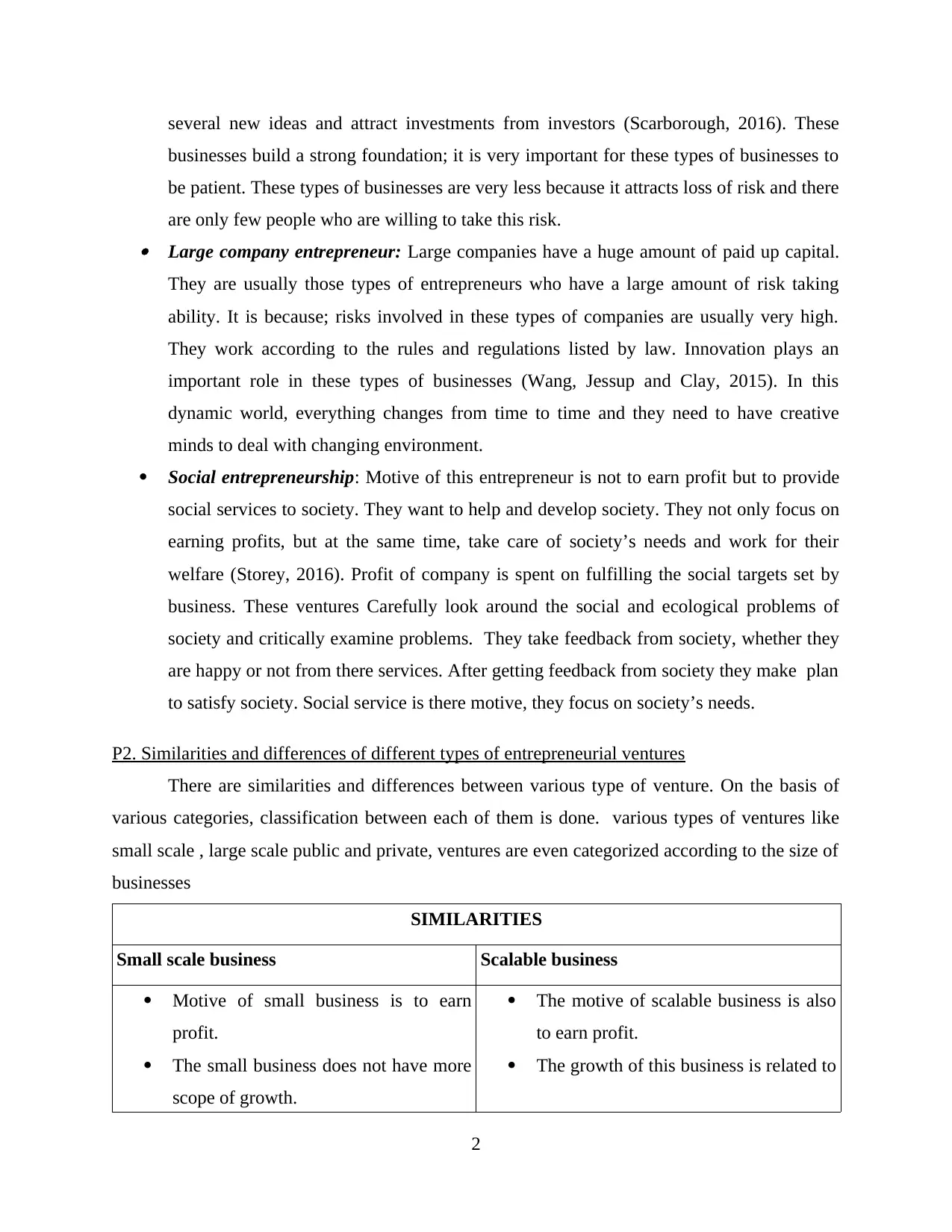
several new ideas and attract investments from investors (Scarborough, 2016). These
businesses build a strong foundation; it is very important for these types of businesses to
be patient. These types of businesses are very less because it attracts loss of risk and there
are only few people who are willing to take this risk. Large company entrepreneur: Large companies have a huge amount of paid up capital.
They are usually those types of entrepreneurs who have a large amount of risk taking
ability. It is because; risks involved in these types of companies are usually very high.
They work according to the rules and regulations listed by law. Innovation plays an
important role in these types of businesses (Wang, Jessup and Clay, 2015). In this
dynamic world, everything changes from time to time and they need to have creative
minds to deal with changing environment.
Social entrepreneurship: Motive of this entrepreneur is not to earn profit but to provide
social services to society. They want to help and develop society. They not only focus on
earning profits, but at the same time, take care of society’s needs and work for their
welfare (Storey, 2016). Profit of company is spent on fulfilling the social targets set by
business. These ventures Carefully look around the social and ecological problems of
society and critically examine problems. They take feedback from society, whether they
are happy or not from there services. After getting feedback from society they make plan
to satisfy society. Social service is there motive, they focus on society’s needs.
P2. Similarities and differences of different types of entrepreneurial ventures
There are similarities and differences between various type of venture. On the basis of
various categories, classification between each of them is done. various types of ventures like
small scale , large scale public and private, ventures are even categorized according to the size of
businesses
SIMILARITIES
Small scale business Scalable business
Motive of small business is to earn
profit.
The small business does not have more
scope of growth.
The motive of scalable business is also
to earn profit.
The growth of this business is related to
2
businesses build a strong foundation; it is very important for these types of businesses to
be patient. These types of businesses are very less because it attracts loss of risk and there
are only few people who are willing to take this risk. Large company entrepreneur: Large companies have a huge amount of paid up capital.
They are usually those types of entrepreneurs who have a large amount of risk taking
ability. It is because; risks involved in these types of companies are usually very high.
They work according to the rules and regulations listed by law. Innovation plays an
important role in these types of businesses (Wang, Jessup and Clay, 2015). In this
dynamic world, everything changes from time to time and they need to have creative
minds to deal with changing environment.
Social entrepreneurship: Motive of this entrepreneur is not to earn profit but to provide
social services to society. They want to help and develop society. They not only focus on
earning profits, but at the same time, take care of society’s needs and work for their
welfare (Storey, 2016). Profit of company is spent on fulfilling the social targets set by
business. These ventures Carefully look around the social and ecological problems of
society and critically examine problems. They take feedback from society, whether they
are happy or not from there services. After getting feedback from society they make plan
to satisfy society. Social service is there motive, they focus on society’s needs.
P2. Similarities and differences of different types of entrepreneurial ventures
There are similarities and differences between various type of venture. On the basis of
various categories, classification between each of them is done. various types of ventures like
small scale , large scale public and private, ventures are even categorized according to the size of
businesses
SIMILARITIES
Small scale business Scalable business
Motive of small business is to earn
profit.
The small business does not have more
scope of growth.
The motive of scalable business is also
to earn profit.
The growth of this business is related to
2
Secure Best Marks with AI Grader
Need help grading? Try our AI Grader for instant feedback on your assignments.
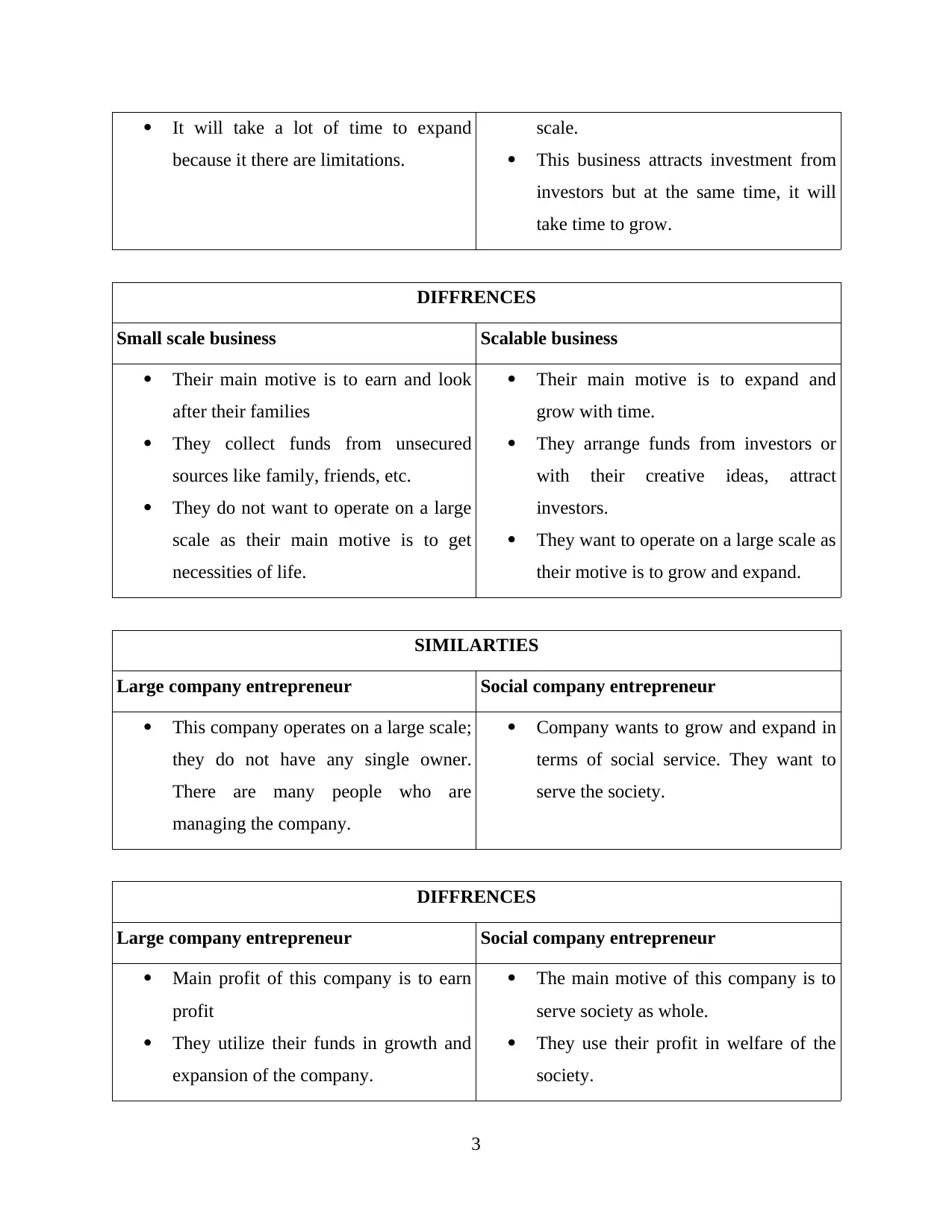
It will take a lot of time to expand
because it there are limitations.
scale.
This business attracts investment from
investors but at the same time, it will
take time to grow.
DIFFRENCES
Small scale business Scalable business
Their main motive is to earn and look
after their families
They collect funds from unsecured
sources like family, friends, etc.
They do not want to operate on a large
scale as their main motive is to get
necessities of life.
Their main motive is to expand and
grow with time.
They arrange funds from investors or
with their creative ideas, attract
investors.
They want to operate on a large scale as
their motive is to grow and expand.
SIMILARTIES
Large company entrepreneur Social company entrepreneur
This company operates on a large scale;
they do not have any single owner.
There are many people who are
managing the company.
Company wants to grow and expand in
terms of social service. They want to
serve the society.
DIFFRENCES
Large company entrepreneur Social company entrepreneur
Main profit of this company is to earn
profit
They utilize their funds in growth and
expansion of the company.
The main motive of this company is to
serve society as whole.
They use their profit in welfare of the
society.
3
because it there are limitations.
scale.
This business attracts investment from
investors but at the same time, it will
take time to grow.
DIFFRENCES
Small scale business Scalable business
Their main motive is to earn and look
after their families
They collect funds from unsecured
sources like family, friends, etc.
They do not want to operate on a large
scale as their main motive is to get
necessities of life.
Their main motive is to expand and
grow with time.
They arrange funds from investors or
with their creative ideas, attract
investors.
They want to operate on a large scale as
their motive is to grow and expand.
SIMILARTIES
Large company entrepreneur Social company entrepreneur
This company operates on a large scale;
they do not have any single owner.
There are many people who are
managing the company.
Company wants to grow and expand in
terms of social service. They want to
serve the society.
DIFFRENCES
Large company entrepreneur Social company entrepreneur
Main profit of this company is to earn
profit
They utilize their funds in growth and
expansion of the company.
The main motive of this company is to
serve society as whole.
They use their profit in welfare of the
society.
3
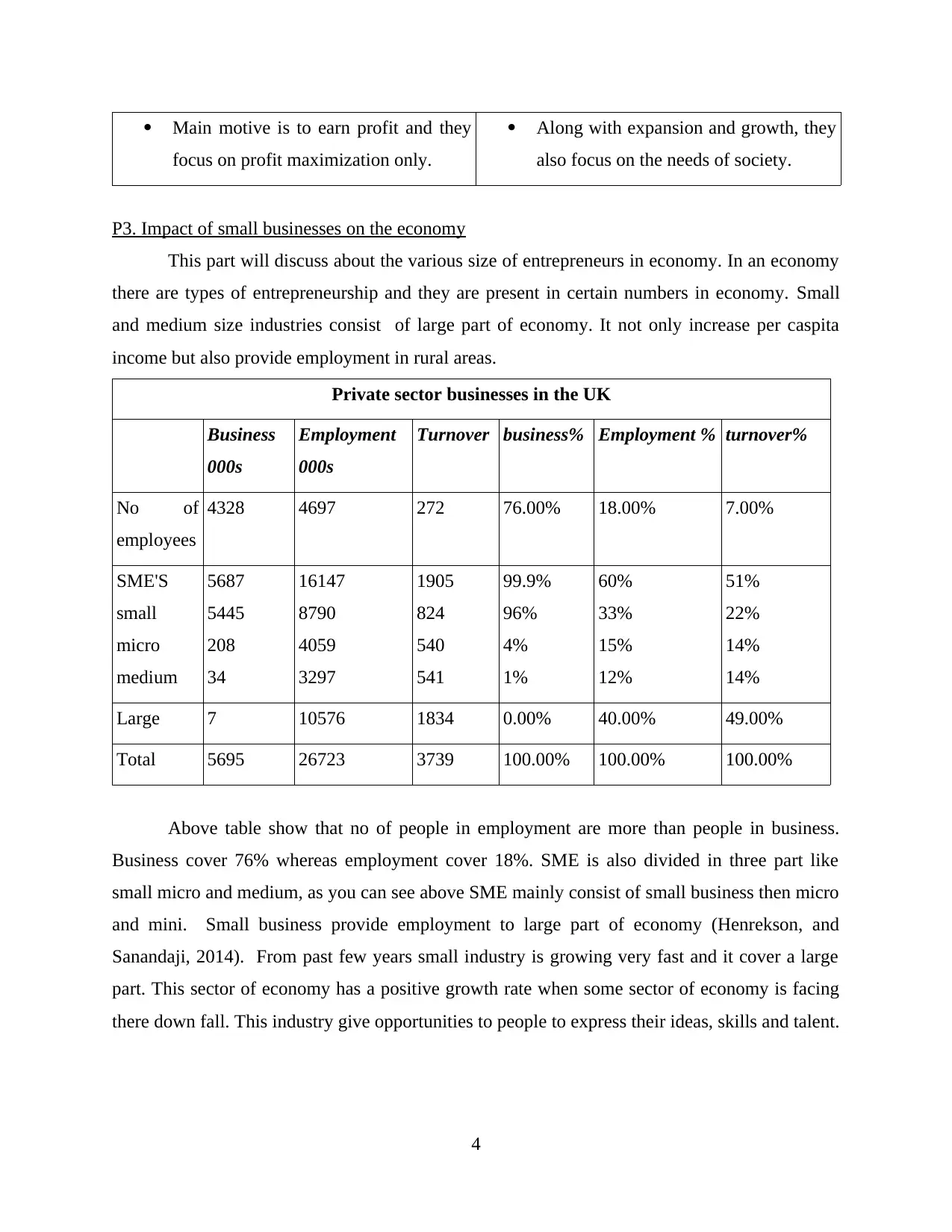
Main motive is to earn profit and they
focus on profit maximization only.
Along with expansion and growth, they
also focus on the needs of society.
P3. Impact of small businesses on the economy
This part will discuss about the various size of entrepreneurs in economy. In an economy
there are types of entrepreneurship and they are present in certain numbers in economy. Small
and medium size industries consist of large part of economy. It not only increase per caspita
income but also provide employment in rural areas.
Private sector businesses in the UK
Business
000s
Employment
000s
Turnover business% Employment % turnover%
No of
employees
4328 4697 272 76.00% 18.00% 7.00%
SME'S
small
micro
medium
5687
5445
208
34
16147
8790
4059
3297
1905
824
540
541
99.9%
96%
4%
1%
60%
33%
15%
12%
51%
22%
14%
14%
Large 7 10576 1834 0.00% 40.00% 49.00%
Total 5695 26723 3739 100.00% 100.00% 100.00%
Above table show that no of people in employment are more than people in business.
Business cover 76% whereas employment cover 18%. SME is also divided in three part like
small micro and medium, as you can see above SME mainly consist of small business then micro
and mini. Small business provide employment to large part of economy (Henrekson, and
Sanandaji, 2014). From past few years small industry is growing very fast and it cover a large
part. This sector of economy has a positive growth rate when some sector of economy is facing
there down fall. This industry give opportunities to people to express their ideas, skills and talent.
4
focus on profit maximization only.
Along with expansion and growth, they
also focus on the needs of society.
P3. Impact of small businesses on the economy
This part will discuss about the various size of entrepreneurs in economy. In an economy
there are types of entrepreneurship and they are present in certain numbers in economy. Small
and medium size industries consist of large part of economy. It not only increase per caspita
income but also provide employment in rural areas.
Private sector businesses in the UK
Business
000s
Employment
000s
Turnover business% Employment % turnover%
No of
employees
4328 4697 272 76.00% 18.00% 7.00%
SME'S
small
micro
medium
5687
5445
208
34
16147
8790
4059
3297
1905
824
540
541
99.9%
96%
4%
1%
60%
33%
15%
12%
51%
22%
14%
14%
Large 7 10576 1834 0.00% 40.00% 49.00%
Total 5695 26723 3739 100.00% 100.00% 100.00%
Above table show that no of people in employment are more than people in business.
Business cover 76% whereas employment cover 18%. SME is also divided in three part like
small micro and medium, as you can see above SME mainly consist of small business then micro
and mini. Small business provide employment to large part of economy (Henrekson, and
Sanandaji, 2014). From past few years small industry is growing very fast and it cover a large
part. This sector of economy has a positive growth rate when some sector of economy is facing
there down fall. This industry give opportunities to people to express their ideas, skills and talent.
4
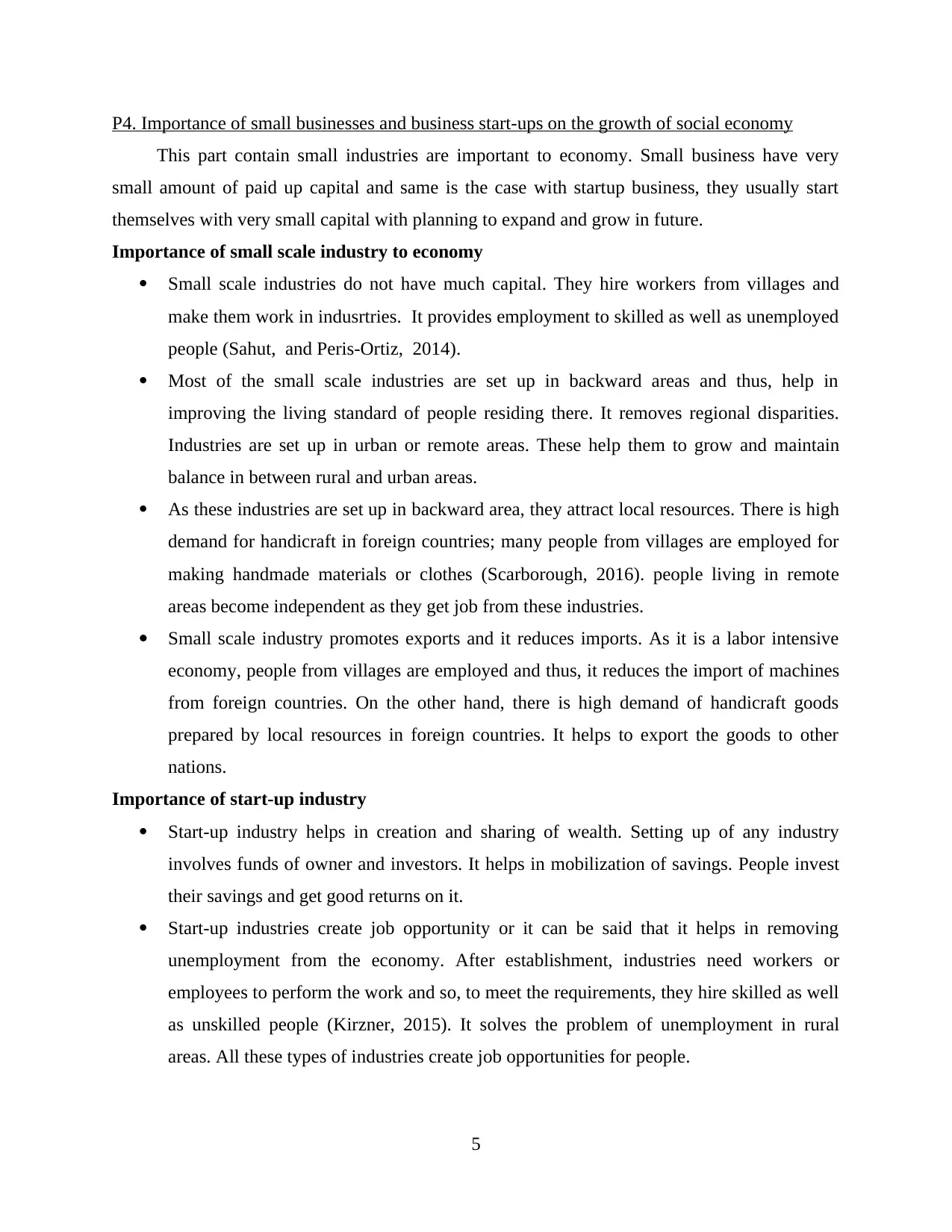
P4. Importance of small businesses and business start-ups on the growth of social economy
This part contain small industries are important to economy. Small business have very
small amount of paid up capital and same is the case with startup business, they usually start
themselves with very small capital with planning to expand and grow in future.
Importance of small scale industry to economy
Small scale industries do not have much capital. They hire workers from villages and
make them work in indusrtries. It provides employment to skilled as well as unemployed
people (Sahut, and Peris-Ortiz, 2014).
Most of the small scale industries are set up in backward areas and thus, help in
improving the living standard of people residing there. It removes regional disparities.
Industries are set up in urban or remote areas. These help them to grow and maintain
balance in between rural and urban areas.
As these industries are set up in backward area, they attract local resources. There is high
demand for handicraft in foreign countries; many people from villages are employed for
making handmade materials or clothes (Scarborough, 2016). people living in remote
areas become independent as they get job from these industries.
Small scale industry promotes exports and it reduces imports. As it is a labor intensive
economy, people from villages are employed and thus, it reduces the import of machines
from foreign countries. On the other hand, there is high demand of handicraft goods
prepared by local resources in foreign countries. It helps to export the goods to other
nations.
Importance of start-up industry
Start-up industry helps in creation and sharing of wealth. Setting up of any industry
involves funds of owner and investors. It helps in mobilization of savings. People invest
their savings and get good returns on it.
Start-up industries create job opportunity or it can be said that it helps in removing
unemployment from the economy. After establishment, industries need workers or
employees to perform the work and so, to meet the requirements, they hire skilled as well
as unskilled people (Kirzner, 2015). It solves the problem of unemployment in rural
areas. All these types of industries create job opportunities for people.
5
This part contain small industries are important to economy. Small business have very
small amount of paid up capital and same is the case with startup business, they usually start
themselves with very small capital with planning to expand and grow in future.
Importance of small scale industry to economy
Small scale industries do not have much capital. They hire workers from villages and
make them work in indusrtries. It provides employment to skilled as well as unemployed
people (Sahut, and Peris-Ortiz, 2014).
Most of the small scale industries are set up in backward areas and thus, help in
improving the living standard of people residing there. It removes regional disparities.
Industries are set up in urban or remote areas. These help them to grow and maintain
balance in between rural and urban areas.
As these industries are set up in backward area, they attract local resources. There is high
demand for handicraft in foreign countries; many people from villages are employed for
making handmade materials or clothes (Scarborough, 2016). people living in remote
areas become independent as they get job from these industries.
Small scale industry promotes exports and it reduces imports. As it is a labor intensive
economy, people from villages are employed and thus, it reduces the import of machines
from foreign countries. On the other hand, there is high demand of handicraft goods
prepared by local resources in foreign countries. It helps to export the goods to other
nations.
Importance of start-up industry
Start-up industry helps in creation and sharing of wealth. Setting up of any industry
involves funds of owner and investors. It helps in mobilization of savings. People invest
their savings and get good returns on it.
Start-up industries create job opportunity or it can be said that it helps in removing
unemployment from the economy. After establishment, industries need workers or
employees to perform the work and so, to meet the requirements, they hire skilled as well
as unskilled people (Kirzner, 2015). It solves the problem of unemployment in rural
areas. All these types of industries create job opportunities for people.
5
Paraphrase This Document
Need a fresh take? Get an instant paraphrase of this document with our AI Paraphraser
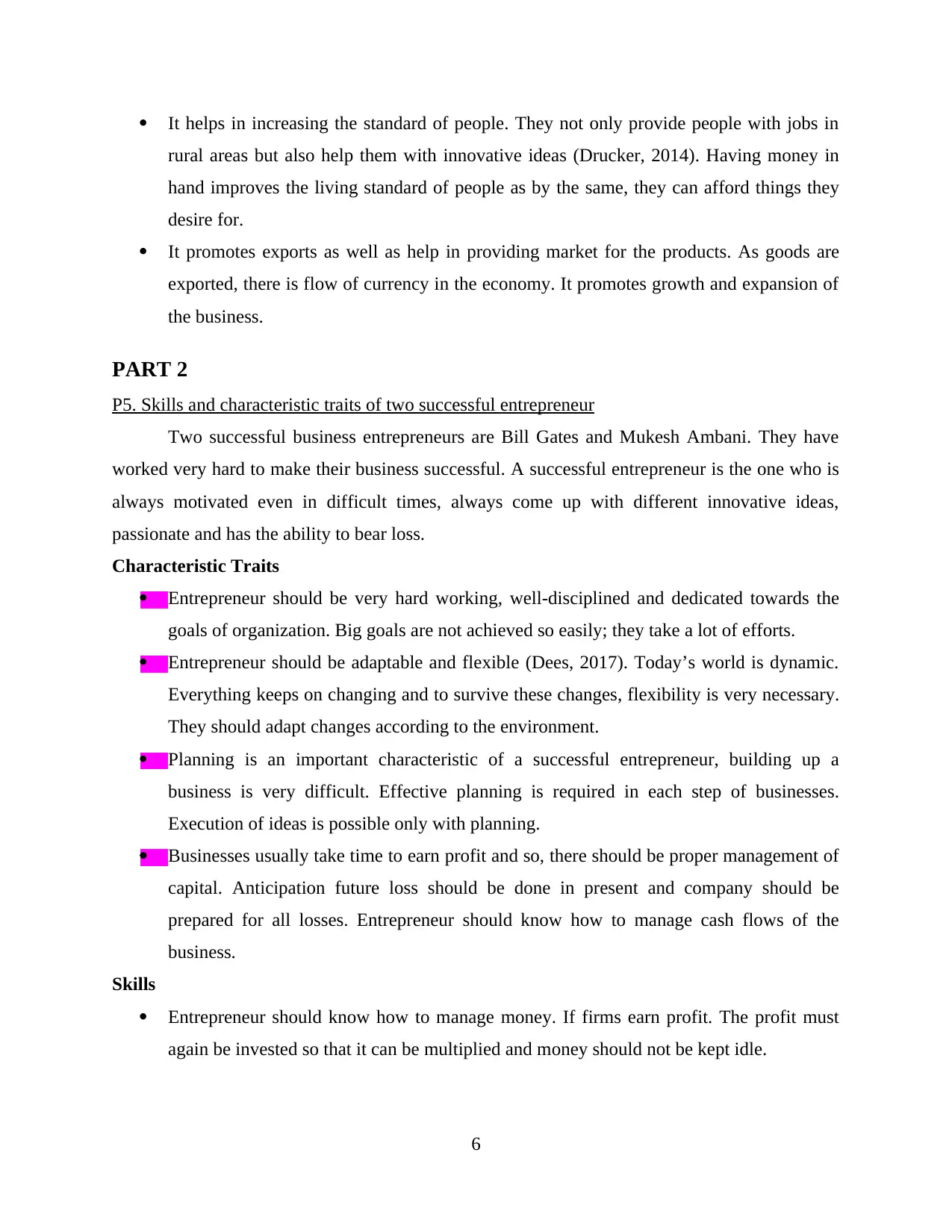
It helps in increasing the standard of people. They not only provide people with jobs in
rural areas but also help them with innovative ideas (Drucker, 2014). Having money in
hand improves the living standard of people as by the same, they can afford things they
desire for.
It promotes exports as well as help in providing market for the products. As goods are
exported, there is flow of currency in the economy. It promotes growth and expansion of
the business.
PART 2
P5. Skills and characteristic traits of two successful entrepreneur
Two successful business entrepreneurs are Bill Gates and Mukesh Ambani. They have
worked very hard to make their business successful. A successful entrepreneur is the one who is
always motivated even in difficult times, always come up with different innovative ideas,
passionate and has the ability to bear loss.
Characteristic Traits
Entrepreneur should be very hard working, well-disciplined and dedicated towards the
goals of organization. Big goals are not achieved so easily; they take a lot of efforts.
Entrepreneur should be adaptable and flexible (Dees, 2017). Today’s world is dynamic.
Everything keeps on changing and to survive these changes, flexibility is very necessary.
They should adapt changes according to the environment.
Planning is an important characteristic of a successful entrepreneur, building up a
business is very difficult. Effective planning is required in each step of businesses.
Execution of ideas is possible only with planning.
Businesses usually take time to earn profit and so, there should be proper management of
capital. Anticipation future loss should be done in present and company should be
prepared for all losses. Entrepreneur should know how to manage cash flows of the
business.
Skills
Entrepreneur should know how to manage money. If firms earn profit. The profit must
again be invested so that it can be multiplied and money should not be kept idle.
6
rural areas but also help them with innovative ideas (Drucker, 2014). Having money in
hand improves the living standard of people as by the same, they can afford things they
desire for.
It promotes exports as well as help in providing market for the products. As goods are
exported, there is flow of currency in the economy. It promotes growth and expansion of
the business.
PART 2
P5. Skills and characteristic traits of two successful entrepreneur
Two successful business entrepreneurs are Bill Gates and Mukesh Ambani. They have
worked very hard to make their business successful. A successful entrepreneur is the one who is
always motivated even in difficult times, always come up with different innovative ideas,
passionate and has the ability to bear loss.
Characteristic Traits
Entrepreneur should be very hard working, well-disciplined and dedicated towards the
goals of organization. Big goals are not achieved so easily; they take a lot of efforts.
Entrepreneur should be adaptable and flexible (Dees, 2017). Today’s world is dynamic.
Everything keeps on changing and to survive these changes, flexibility is very necessary.
They should adapt changes according to the environment.
Planning is an important characteristic of a successful entrepreneur, building up a
business is very difficult. Effective planning is required in each step of businesses.
Execution of ideas is possible only with planning.
Businesses usually take time to earn profit and so, there should be proper management of
capital. Anticipation future loss should be done in present and company should be
prepared for all losses. Entrepreneur should know how to manage cash flows of the
business.
Skills
Entrepreneur should know how to manage money. If firms earn profit. The profit must
again be invested so that it can be multiplied and money should not be kept idle.
6
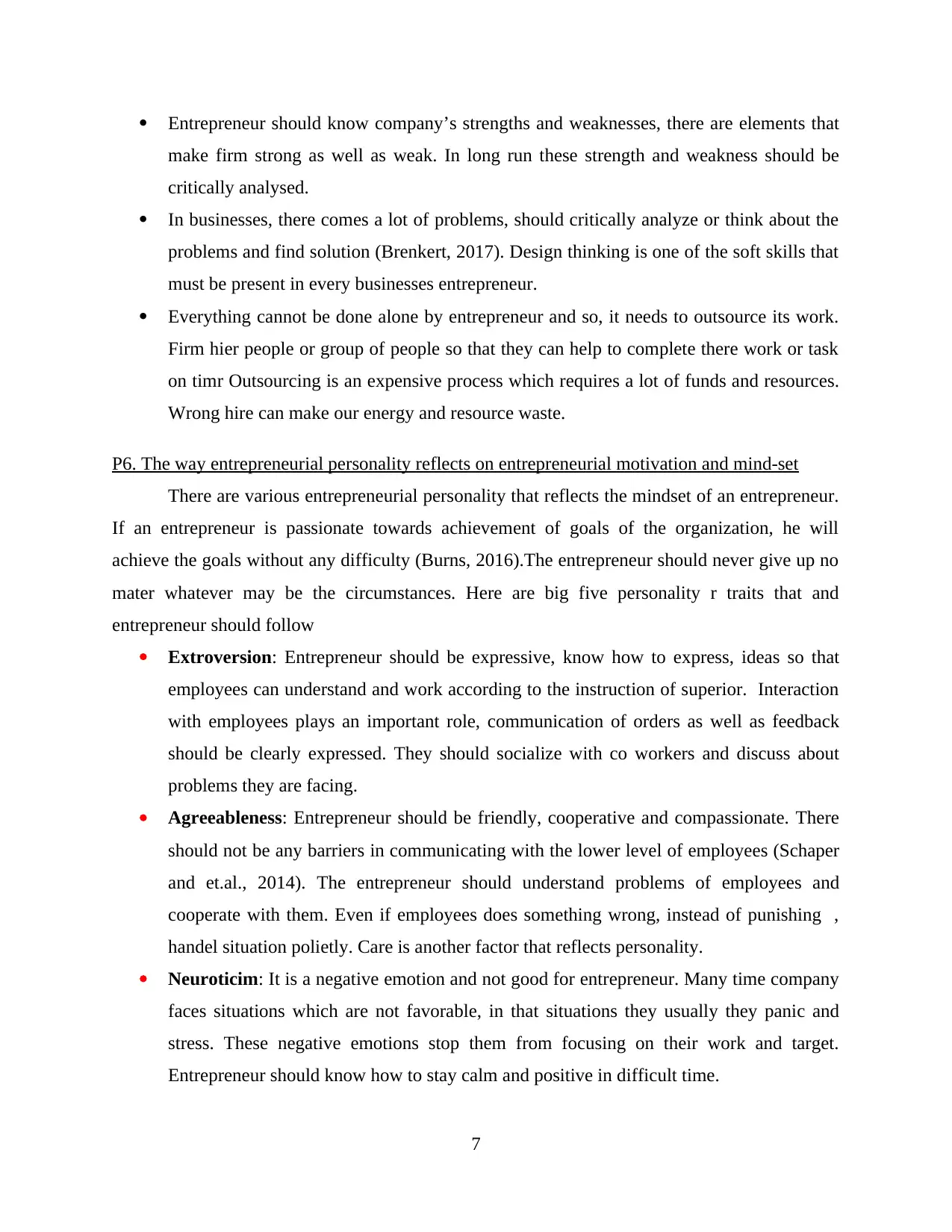
Entrepreneur should know company’s strengths and weaknesses, there are elements that
make firm strong as well as weak. In long run these strength and weakness should be
critically analysed.
In businesses, there comes a lot of problems, should critically analyze or think about the
problems and find solution (Brenkert, 2017). Design thinking is one of the soft skills that
must be present in every businesses entrepreneur.
Everything cannot be done alone by entrepreneur and so, it needs to outsource its work.
Firm hier people or group of people so that they can help to complete there work or task
on timr Outsourcing is an expensive process which requires a lot of funds and resources.
Wrong hire can make our energy and resource waste.
P6. The way entrepreneurial personality reflects on entrepreneurial motivation and mind-set
There are various entrepreneurial personality that reflects the mindset of an entrepreneur.
If an entrepreneur is passionate towards achievement of goals of the organization, he will
achieve the goals without any difficulty (Burns, 2016).The entrepreneur should never give up no
mater whatever may be the circumstances. Here are big five personality r traits that and
entrepreneur should follow
Extroversion: Entrepreneur should be expressive, know how to express, ideas so that
employees can understand and work according to the instruction of superior. Interaction
with employees plays an important role, communication of orders as well as feedback
should be clearly expressed. They should socialize with co workers and discuss about
problems they are facing.
Agreeableness: Entrepreneur should be friendly, cooperative and compassionate. There
should not be any barriers in communicating with the lower level of employees (Schaper
and et.al., 2014). The entrepreneur should understand problems of employees and
cooperate with them. Even if employees does something wrong, instead of punishing ,
handel situation polietly. Care is another factor that reflects personality.
Neuroticim: It is a negative emotion and not good for entrepreneur. Many time company
faces situations which are not favorable, in that situations they usually they panic and
stress. These negative emotions stop them from focusing on their work and target.
Entrepreneur should know how to stay calm and positive in difficult time.
7
make firm strong as well as weak. In long run these strength and weakness should be
critically analysed.
In businesses, there comes a lot of problems, should critically analyze or think about the
problems and find solution (Brenkert, 2017). Design thinking is one of the soft skills that
must be present in every businesses entrepreneur.
Everything cannot be done alone by entrepreneur and so, it needs to outsource its work.
Firm hier people or group of people so that they can help to complete there work or task
on timr Outsourcing is an expensive process which requires a lot of funds and resources.
Wrong hire can make our energy and resource waste.
P6. The way entrepreneurial personality reflects on entrepreneurial motivation and mind-set
There are various entrepreneurial personality that reflects the mindset of an entrepreneur.
If an entrepreneur is passionate towards achievement of goals of the organization, he will
achieve the goals without any difficulty (Burns, 2016).The entrepreneur should never give up no
mater whatever may be the circumstances. Here are big five personality r traits that and
entrepreneur should follow
Extroversion: Entrepreneur should be expressive, know how to express, ideas so that
employees can understand and work according to the instruction of superior. Interaction
with employees plays an important role, communication of orders as well as feedback
should be clearly expressed. They should socialize with co workers and discuss about
problems they are facing.
Agreeableness: Entrepreneur should be friendly, cooperative and compassionate. There
should not be any barriers in communicating with the lower level of employees (Schaper
and et.al., 2014). The entrepreneur should understand problems of employees and
cooperate with them. Even if employees does something wrong, instead of punishing ,
handel situation polietly. Care is another factor that reflects personality.
Neuroticim: It is a negative emotion and not good for entrepreneur. Many time company
faces situations which are not favorable, in that situations they usually they panic and
stress. These negative emotions stop them from focusing on their work and target.
Entrepreneur should know how to stay calm and positive in difficult time.
7
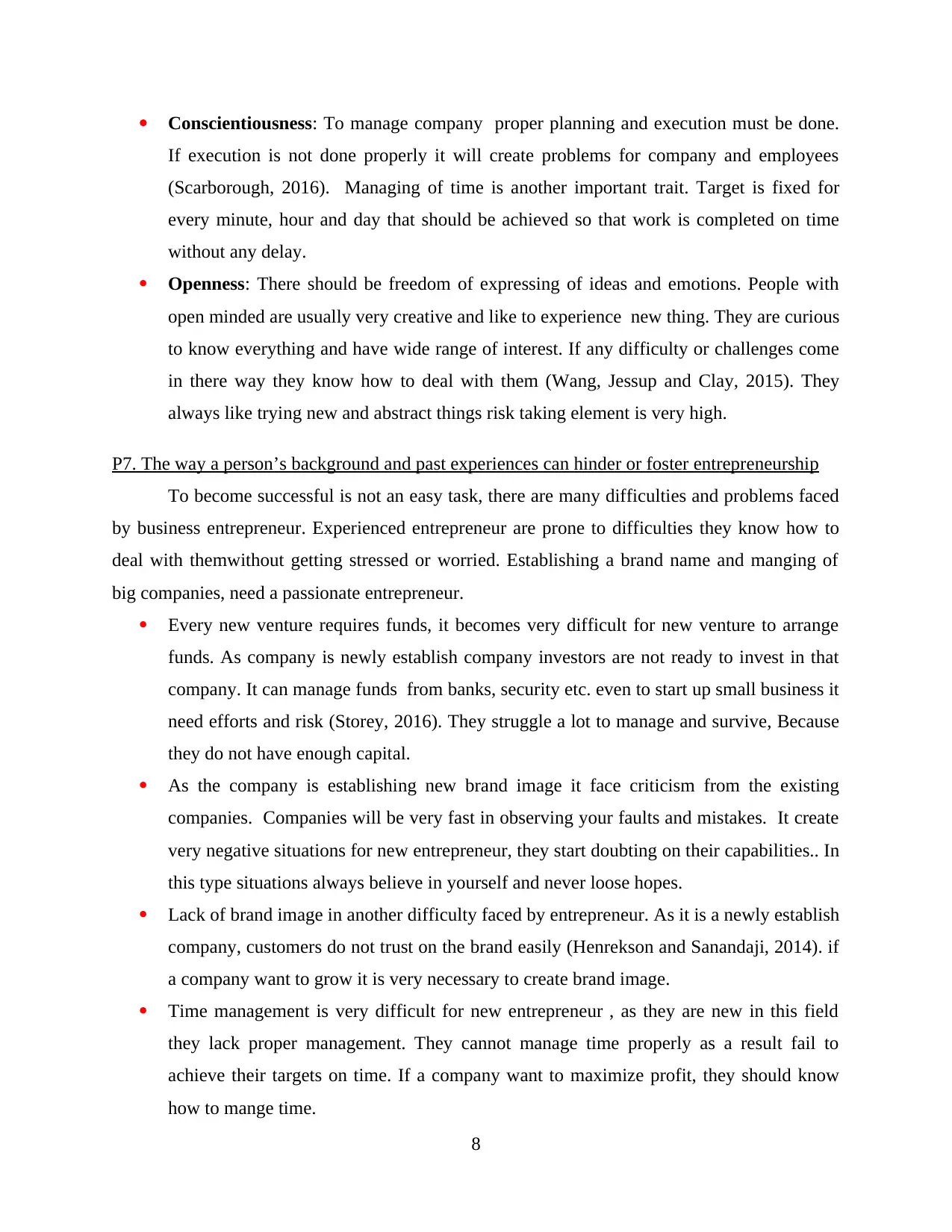
Conscientiousness: To manage company proper planning and execution must be done.
If execution is not done properly it will create problems for company and employees
(Scarborough, 2016). Managing of time is another important trait. Target is fixed for
every minute, hour and day that should be achieved so that work is completed on time
without any delay.
Openness: There should be freedom of expressing of ideas and emotions. People with
open minded are usually very creative and like to experience new thing. They are curious
to know everything and have wide range of interest. If any difficulty or challenges come
in there way they know how to deal with them (Wang, Jessup and Clay, 2015). They
always like trying new and abstract things risk taking element is very high.
P7. The way a person’s background and past experiences can hinder or foster entrepreneurship
To become successful is not an easy task, there are many difficulties and problems faced
by business entrepreneur. Experienced entrepreneur are prone to difficulties they know how to
deal with themwithout getting stressed or worried. Establishing a brand name and manging of
big companies, need a passionate entrepreneur.
Every new venture requires funds, it becomes very difficult for new venture to arrange
funds. As company is newly establish company investors are not ready to invest in that
company. It can manage funds from banks, security etc. even to start up small business it
need efforts and risk (Storey, 2016). They struggle a lot to manage and survive, Because
they do not have enough capital.
As the company is establishing new brand image it face criticism from the existing
companies. Companies will be very fast in observing your faults and mistakes. It create
very negative situations for new entrepreneur, they start doubting on their capabilities.. In
this type situations always believe in yourself and never loose hopes.
Lack of brand image in another difficulty faced by entrepreneur. As it is a newly establish
company, customers do not trust on the brand easily (Henrekson and Sanandaji, 2014). if
a company want to grow it is very necessary to create brand image.
Time management is very difficult for new entrepreneur , as they are new in this field
they lack proper management. They cannot manage time properly as a result fail to
achieve their targets on time. If a company want to maximize profit, they should know
how to mange time.
8
If execution is not done properly it will create problems for company and employees
(Scarborough, 2016). Managing of time is another important trait. Target is fixed for
every minute, hour and day that should be achieved so that work is completed on time
without any delay.
Openness: There should be freedom of expressing of ideas and emotions. People with
open minded are usually very creative and like to experience new thing. They are curious
to know everything and have wide range of interest. If any difficulty or challenges come
in there way they know how to deal with them (Wang, Jessup and Clay, 2015). They
always like trying new and abstract things risk taking element is very high.
P7. The way a person’s background and past experiences can hinder or foster entrepreneurship
To become successful is not an easy task, there are many difficulties and problems faced
by business entrepreneur. Experienced entrepreneur are prone to difficulties they know how to
deal with themwithout getting stressed or worried. Establishing a brand name and manging of
big companies, need a passionate entrepreneur.
Every new venture requires funds, it becomes very difficult for new venture to arrange
funds. As company is newly establish company investors are not ready to invest in that
company. It can manage funds from banks, security etc. even to start up small business it
need efforts and risk (Storey, 2016). They struggle a lot to manage and survive, Because
they do not have enough capital.
As the company is establishing new brand image it face criticism from the existing
companies. Companies will be very fast in observing your faults and mistakes. It create
very negative situations for new entrepreneur, they start doubting on their capabilities.. In
this type situations always believe in yourself and never loose hopes.
Lack of brand image in another difficulty faced by entrepreneur. As it is a newly establish
company, customers do not trust on the brand easily (Henrekson and Sanandaji, 2014). if
a company want to grow it is very necessary to create brand image.
Time management is very difficult for new entrepreneur , as they are new in this field
they lack proper management. They cannot manage time properly as a result fail to
achieve their targets on time. If a company want to maximize profit, they should know
how to mange time.
8
Secure Best Marks with AI Grader
Need help grading? Try our AI Grader for instant feedback on your assignments.
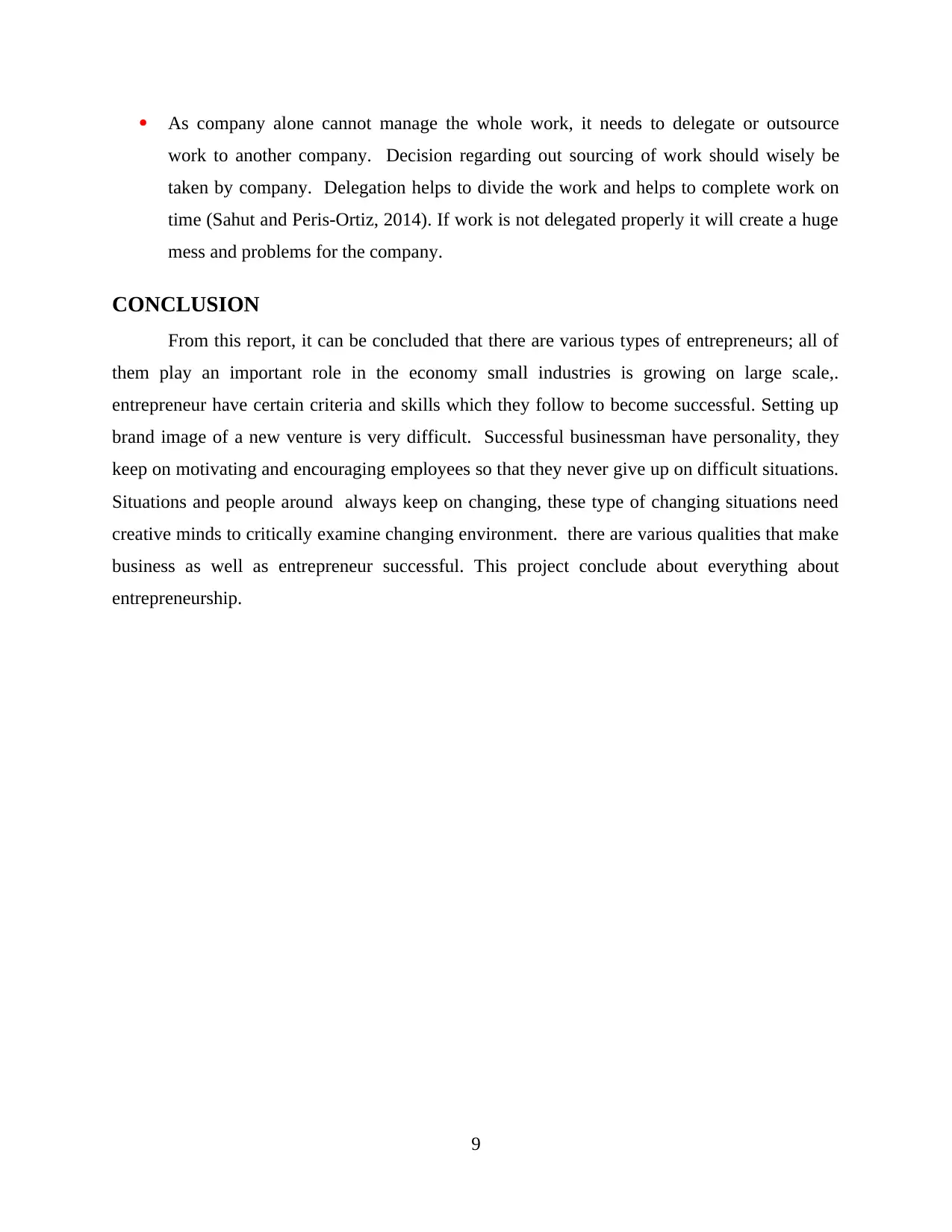
As company alone cannot manage the whole work, it needs to delegate or outsource
work to another company. Decision regarding out sourcing of work should wisely be
taken by company. Delegation helps to divide the work and helps to complete work on
time (Sahut and Peris-Ortiz, 2014). If work is not delegated properly it will create a huge
mess and problems for the company.
CONCLUSION
From this report, it can be concluded that there are various types of entrepreneurs; all of
them play an important role in the economy small industries is growing on large scale,.
entrepreneur have certain criteria and skills which they follow to become successful. Setting up
brand image of a new venture is very difficult. Successful businessman have personality, they
keep on motivating and encouraging employees so that they never give up on difficult situations.
Situations and people around always keep on changing, these type of changing situations need
creative minds to critically examine changing environment. there are various qualities that make
business as well as entrepreneur successful. This project conclude about everything about
entrepreneurship.
9
work to another company. Decision regarding out sourcing of work should wisely be
taken by company. Delegation helps to divide the work and helps to complete work on
time (Sahut and Peris-Ortiz, 2014). If work is not delegated properly it will create a huge
mess and problems for the company.
CONCLUSION
From this report, it can be concluded that there are various types of entrepreneurs; all of
them play an important role in the economy small industries is growing on large scale,.
entrepreneur have certain criteria and skills which they follow to become successful. Setting up
brand image of a new venture is very difficult. Successful businessman have personality, they
keep on motivating and encouraging employees so that they never give up on difficult situations.
Situations and people around always keep on changing, these type of changing situations need
creative minds to critically examine changing environment. there are various qualities that make
business as well as entrepreneur successful. This project conclude about everything about
entrepreneurship.
9
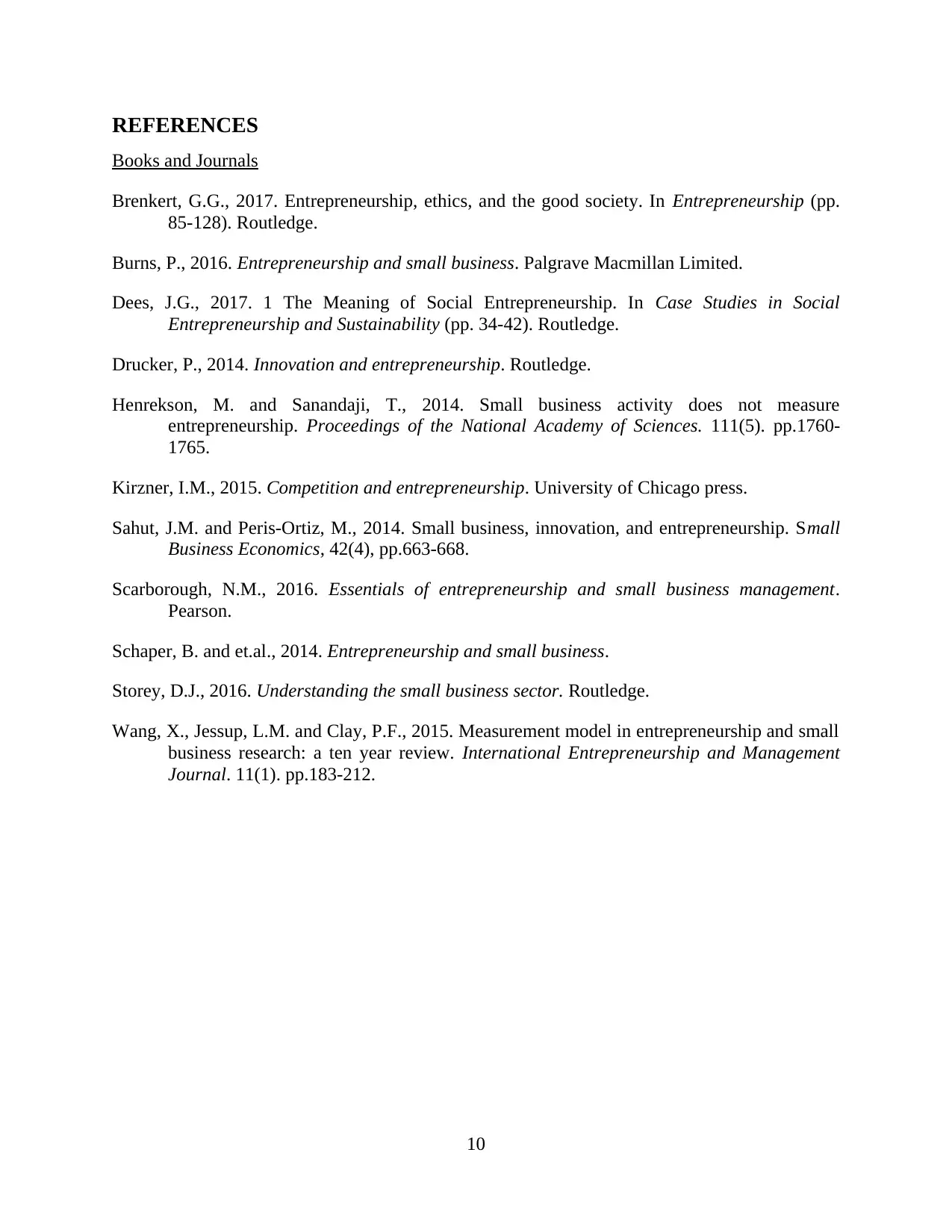
REFERENCES
Books and Journals
Brenkert, G.G., 2017. Entrepreneurship, ethics, and the good society. In Entrepreneurship (pp.
85-128). Routledge.
Burns, P., 2016. Entrepreneurship and small business. Palgrave Macmillan Limited.
Dees, J.G., 2017. 1 The Meaning of Social Entrepreneurship. In Case Studies in Social
Entrepreneurship and Sustainability (pp. 34-42). Routledge.
Drucker, P., 2014. Innovation and entrepreneurship. Routledge.
Henrekson, M. and Sanandaji, T., 2014. Small business activity does not measure
entrepreneurship. Proceedings of the National Academy of Sciences. 111(5). pp.1760-
1765.
Kirzner, I.M., 2015. Competition and entrepreneurship. University of Chicago press.
Sahut, J.M. and Peris-Ortiz, M., 2014. Small business, innovation, and entrepreneurship. Small
Business Economics, 42(4), pp.663-668.
Scarborough, N.M., 2016. Essentials of entrepreneurship and small business management.
Pearson.
Schaper, B. and et.al., 2014. Entrepreneurship and small business.
Storey, D.J., 2016. Understanding the small business sector. Routledge.
Wang, X., Jessup, L.M. and Clay, P.F., 2015. Measurement model in entrepreneurship and small
business research: a ten year review. International Entrepreneurship and Management
Journal. 11(1). pp.183-212.
10
Books and Journals
Brenkert, G.G., 2017. Entrepreneurship, ethics, and the good society. In Entrepreneurship (pp.
85-128). Routledge.
Burns, P., 2016. Entrepreneurship and small business. Palgrave Macmillan Limited.
Dees, J.G., 2017. 1 The Meaning of Social Entrepreneurship. In Case Studies in Social
Entrepreneurship and Sustainability (pp. 34-42). Routledge.
Drucker, P., 2014. Innovation and entrepreneurship. Routledge.
Henrekson, M. and Sanandaji, T., 2014. Small business activity does not measure
entrepreneurship. Proceedings of the National Academy of Sciences. 111(5). pp.1760-
1765.
Kirzner, I.M., 2015. Competition and entrepreneurship. University of Chicago press.
Sahut, J.M. and Peris-Ortiz, M., 2014. Small business, innovation, and entrepreneurship. Small
Business Economics, 42(4), pp.663-668.
Scarborough, N.M., 2016. Essentials of entrepreneurship and small business management.
Pearson.
Schaper, B. and et.al., 2014. Entrepreneurship and small business.
Storey, D.J., 2016. Understanding the small business sector. Routledge.
Wang, X., Jessup, L.M. and Clay, P.F., 2015. Measurement model in entrepreneurship and small
business research: a ten year review. International Entrepreneurship and Management
Journal. 11(1). pp.183-212.
10
1 out of 12
Related Documents
Your All-in-One AI-Powered Toolkit for Academic Success.
+13062052269
info@desklib.com
Available 24*7 on WhatsApp / Email
![[object Object]](/_next/static/media/star-bottom.7253800d.svg)
Unlock your academic potential
© 2024 | Zucol Services PVT LTD | All rights reserved.





